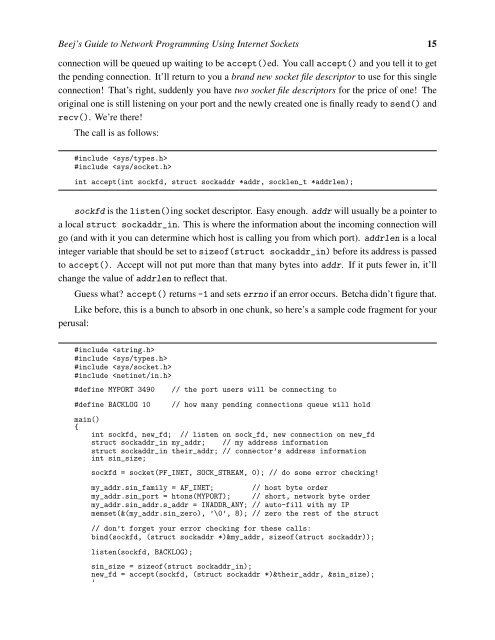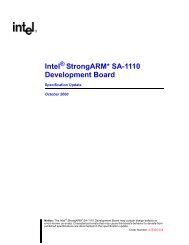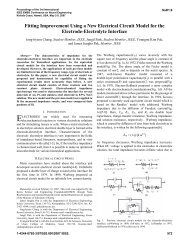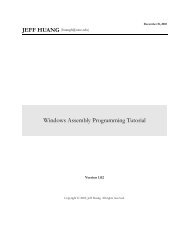Beej's Guide to Network Programming Using Internet Sockets
Beej's Guide to Network Programming Using Internet Sockets
Beej's Guide to Network Programming Using Internet Sockets
- No tags were found...
You also want an ePaper? Increase the reach of your titles
YUMPU automatically turns print PDFs into web optimized ePapers that Google loves.
Beej’s <strong>Guide</strong> <strong>to</strong> <strong>Network</strong> <strong>Programming</strong> <strong>Using</strong> <strong>Internet</strong> <strong>Sockets</strong> 15connection will be queued up waiting <strong>to</strong> be accept()ed. You call accept() and you tell it <strong>to</strong> getthe pending connection. It’ll return <strong>to</strong> you a brand new socket file descrip<strong>to</strong>r <strong>to</strong> use for this singleconnection! That’s right, suddenly you have two socket file descrip<strong>to</strong>rs for the price of one! Theoriginal one is still listening on your port and the newly created one is finally ready <strong>to</strong> send() andrecv(). We’re there!The call is as follows:#include #include int accept(int sockfd, struct sockaddr *addr, socklen_t *addrlen);sockfd is the listen()ing socket descrip<strong>to</strong>r. Easy enough. addr will usually be a pointer <strong>to</strong>a local struct sockaddr_in. This is where the information about the incoming connection willgo (and with it you can determine which host is calling you from which port). addrlen is a localinteger variable that should be set <strong>to</strong> sizeof(struct sockaddr_in) before its address is passed<strong>to</strong> accept(). Accept will not put more than that many bytes in<strong>to</strong> addr. If it puts fewer in, it’llchange the value of addrlen <strong>to</strong> reflect that.Guess what? accept() returns -1 and sets errno if an error occurs. Betcha didn’t figure that.Like before, this is a bunch <strong>to</strong> absorb in one chunk, so here’s a sample code fragment for yourperusal:#include #include #include #include #define MYPORT 3490#define BACKLOG 10// the port users will be connecting <strong>to</strong>// how many pending connections queue will holdmain(){int sockfd, new_fd; // listen on sock_fd, new connection on new_fdstruct sockaddr_in my_addr; // my address informationstruct sockaddr_in their_addr; // connec<strong>to</strong>r’s address informationint sin_size;sockfd = socket(PF_INET, SOCK_STREAM, 0); // do some error checking!my_addr.sin_family = AF_INET; // host byte ordermy_addr.sin_port = h<strong>to</strong>ns(MYPORT); // short, network byte ordermy_addr.sin_addr.s_addr = INADDR_ANY; // au<strong>to</strong>-fill with my IPmemset(&(my_addr.sin_zero), ’\0’, 8); // zero the rest of the struct// don’t forget your error checking for these calls:bind(sockfd, (struct sockaddr *)&my_addr, sizeof(struct sockaddr));listen(sockfd, BACKLOG);sin_size = sizeof(struct sockaddr_in);new_fd = accept(sockfd, (struct sockaddr *)&their_addr, &sin_size);.












